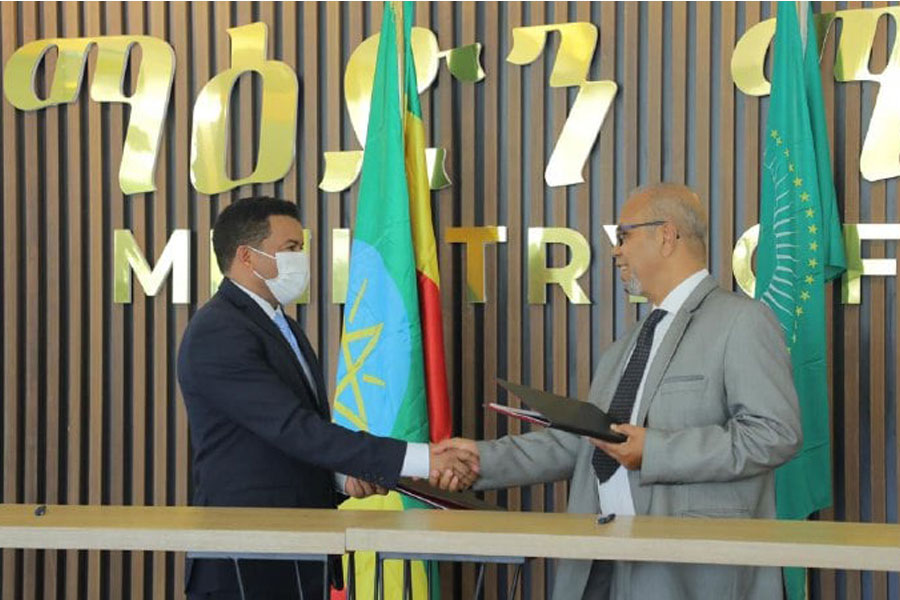
Radar | Sep 28,2019
A dire situation unfolds across public universities, where students face the harsh reality of declining food quality and quantity, a problem seen as a manifestation of a broader crisis across the higher education system. Over the past three years, college students have seen a reduction in the variety and portion sizes of meals, compounded by rising food prices. It forces many to reconsider their meal plans, despite the universities' billions of Birr in annual budget. The struggle to maintain adequate food services amidst inflation is a common thread across the country's higher education institutions. With a paltry daily food budget of 22 Br for a student, universities are barely keeping up with the rising cost of living, which outstrips the nominal increases in their budgets.
Guche Gule, the recently appointed president of Wolaita Sodo University, has had to alter the cafeteria menu to include cheaper staples like rice and pasta more frequently due to the soaring costs of traditional ingredients. At Arbaminch University, 500Km south of the capital, the crisis has led to the breakdown of established supply chains. Student leaders say the University is now buying food directly from vendors as temporary relief after the primary food supplier withdrew due to the untenable economic environment. Dila University has cut its academic year by 15 days to stretch its budget further, uncovering the depth of the financial woes faced by these institutions.
The situation is exacerbated by a national policy that has not adjusted adequately to the economic realities. Despite a recent increase, the daily meal allocation of 22 Br for a student is grossly insufficient compared to the rising costs of essential commodities, leading to significant nutritional and academic repercussions. Samuel Kifle, acting president of Addis Abeba University, advocates for a more targeted approach to financial aid, urging scholarships for the neediest students and a thorough overhaul of the subsidy system.
In response to the escalating crisis, a consortium of public universities has been actively lobbying the federal government for increased funding. The Ministry of Education has formed a committee to explore long-term solutions, including the possibility of university autonomy and the introduction of student loans and financial credit systems — strategies that aim to address the dependency on state subsidies. The broader economic context cannot be ignored as the federal government wrestles with a budget deficit and prioritises austerity measures, including debt servicing, which consumes a considerable share of the national budget. Its fiscal conservatism affects higher education institutions and the broader economy, challenging the sustainability of public higher education in an era of acute fiscal constraints and calls for solutions to preserve the academic future of the country's youth.
You can read the full story here
PUBLISHED ON
Apr 28,2024 [ VOL
25 , NO
1252]

Radar | Sep 28,2019

Commentaries | Aug 06,2022

Viewpoints | Jan 04,2020

Radar | Apr 25,2020

Radar | Jun 11,2022

Fortune News | Jan 15,2022

Editorial | Oct 03,2020

Fortune News | Jun 11,2022

Radar | Jan 03,2021

Radar | Oct 10,2020

Feb 24 , 2024 . By MUNIR SHEMSU
Abel Yeshitila, a real estate developer with a 12-year track record, finds himself unable to sell homes in his latest venture. Despite slash...

Feb 10 , 2024 . By MUNIR SHEMSU
In his last week's address to Parliament, Prime Minister Abiy Ahmed (PhD) painted a picture of an economy...

Jan 7 , 2024
In the realm of international finance and diplomacy, few cities hold the distinction that Addis Abeba doe...

Sep 30 , 2023 . By AKSAH ITALO
On a chilly morning outside Ke'Geberew Market, Yeshi Chane, a 35-year-old mother cradling her seven-month-old baby, stands amidst the throng...

May 2 , 2024
For successive generations of Ethiopia's tax authorities, the chore of tax collection...

Apr 27 , 2024
The Prosperity Party (PP) - Prosperitians - is charting a course through treacherous...

Apr 20 , 2024
In a departure from its traditionally opaque practices, the National Bank of Ethiopia...

Apr 13 , 2024
In the hushed corridors of the legislative house on Lorenzo Te'azaz Road (Arat Kilo)...